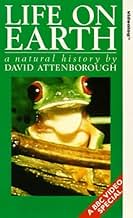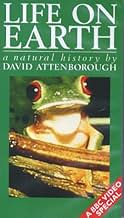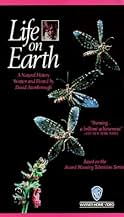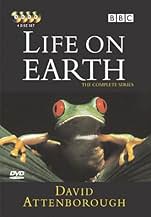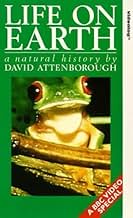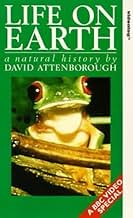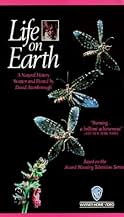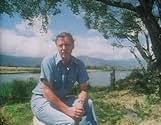Life on Earth
- Minissérie de televisão
- 1979
- 54 min
AVALIAÇÃO DA IMDb
9,1/10
3,3 mil
SUA AVALIAÇÃO
Adicionar um enredo no seu idiomaDavid Attenborough's groundbreaking study of the evolution of life on our planet.David Attenborough's groundbreaking study of the evolution of life on our planet.David Attenborough's groundbreaking study of the evolution of life on our planet.
- Artista
- Indicado para 4 prêmios BAFTA
- 1 vitória e 4 indicações no total
Explorar episódios
Enredo
Você sabia?
- CuriosidadesAn additional item on the DVD is David Attenborough being interviewed by fellow naturalist Tony Soper regarding the making of Life on Earth including the equipment used (at around 23 mins)
- Citações
David Attenborough: There are some four million different kinds of animals and plants in the world. Four million different solutions to the problems of staying alive. This is the story of how a few of them came to be as they are.
- Versões alternativasThe original home video release was severely edited down to fit on two video tapes, meaning half or more of the original broadcast was omitted.
- ConexõesFeatured in Zoo - Um Z E Dois Zeros (1985)
Avaliação em destaque
Life on Earth is a comprehensive analysis of Life on this planet, ranging from the beginnings of life to the evolution of Homo sapiens. The individual episodes are chronological in relation to the colonisation and evolution of life generally. So the very first episode starts with the early earth and the environments found upon it, the last being about the great apes, with an emphasis on humans.
Life on Earth explains masterfully very complex and important concepts in Biology, going so far as to describe and explain DNA and how evolution changes it. Key concepts like these are explained using certain "case studies", i.e. specific species which are entertaining (and often funny) for the spectators, that inherently pertain to the subject being discussed. So, for example, the evolution of camouflage is analysed using the peppered moth, which changed during the industrial revolution because of the smog which blackened the trees.
Attenborough, nowadays, has a legendary reputation as the founder of accurate and entertaining wildlife film-making. And this is where it all started. This series is the base structure of every wildlife documentary ever made in and after the 80's. Attenborough is both a masterful story-teller and modest teacher, skillfully avoiding the two most fatal flaws in presenting, that still goes on today. Firstly, he avoids "telling" the spectators what to think or see as opposed to "showing" it to them, so they can make their own minds up, where many presenters use patronising language or over simplified explanations. And also, Attenborough remains humble throughout the whole process. Presenters today (2012) like Prof. Brian Cox seem pretentious in comparison, often appearing suddenly from behind pillars or speaking meaninglessly with the sun pointing towards the camera. Essentially, they use clever cinematography to waste screen time and "waffle" to use a technical term. Attenborough merely uses his presence as an aid for the audience, even as a guinea pig occasionally.
If you haven't seen this documentary and you are often inclined to watch such a program, get the box set now. It will be the best £15 you have ever spent, and you could learn a surprising amount about nature. I know I did.
HAIL! Sir David!
Life on Earth explains masterfully very complex and important concepts in Biology, going so far as to describe and explain DNA and how evolution changes it. Key concepts like these are explained using certain "case studies", i.e. specific species which are entertaining (and often funny) for the spectators, that inherently pertain to the subject being discussed. So, for example, the evolution of camouflage is analysed using the peppered moth, which changed during the industrial revolution because of the smog which blackened the trees.
Attenborough, nowadays, has a legendary reputation as the founder of accurate and entertaining wildlife film-making. And this is where it all started. This series is the base structure of every wildlife documentary ever made in and after the 80's. Attenborough is both a masterful story-teller and modest teacher, skillfully avoiding the two most fatal flaws in presenting, that still goes on today. Firstly, he avoids "telling" the spectators what to think or see as opposed to "showing" it to them, so they can make their own minds up, where many presenters use patronising language or over simplified explanations. And also, Attenborough remains humble throughout the whole process. Presenters today (2012) like Prof. Brian Cox seem pretentious in comparison, often appearing suddenly from behind pillars or speaking meaninglessly with the sun pointing towards the camera. Essentially, they use clever cinematography to waste screen time and "waffle" to use a technical term. Attenborough merely uses his presence as an aid for the audience, even as a guinea pig occasionally.
If you haven't seen this documentary and you are often inclined to watch such a program, get the box set now. It will be the best £15 you have ever spent, and you could learn a surprising amount about nature. I know I did.
HAIL! Sir David!
- frogfrognewt
- 9 de fev. de 2012
- Link permanente
Principais escolhas
Faça login para avaliar e ver a lista de recomendações personalizadas
Detalhes
- Data de lançamento
- País de origem
- Central de atendimento oficial
- Idioma
- Também conhecido como
- Життя на Землі
- Locações de filme
- Empresas de produção
- Consulte mais créditos da empresa na IMDbPro
Contribua para esta página
Sugerir uma alteração ou adicionar conteúdo ausente

Principal brecha
By what name was Life on Earth (1979) officially released in Canada in English?
Responda
